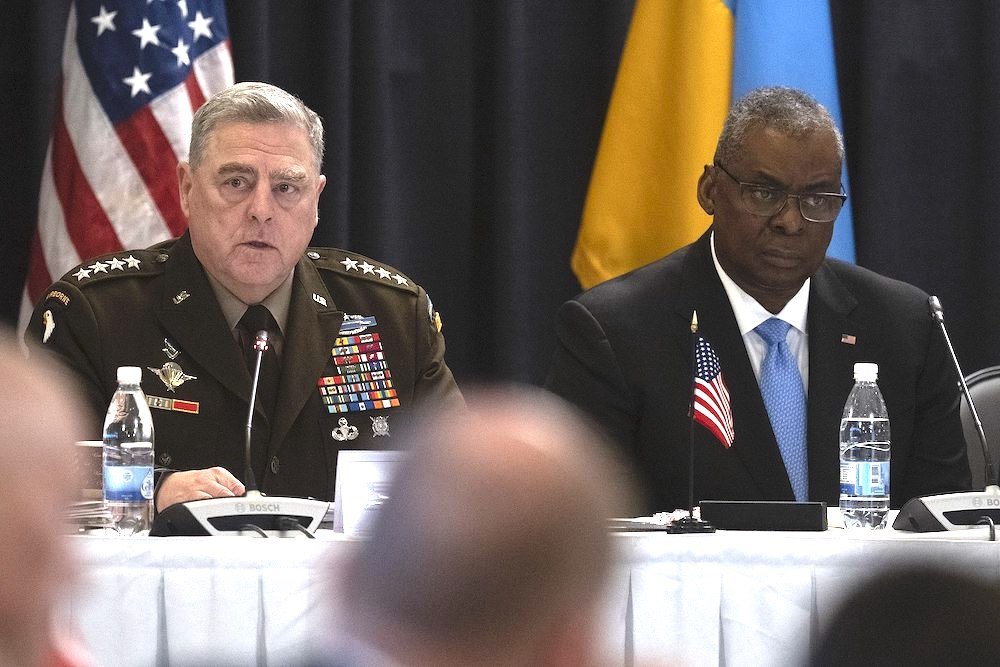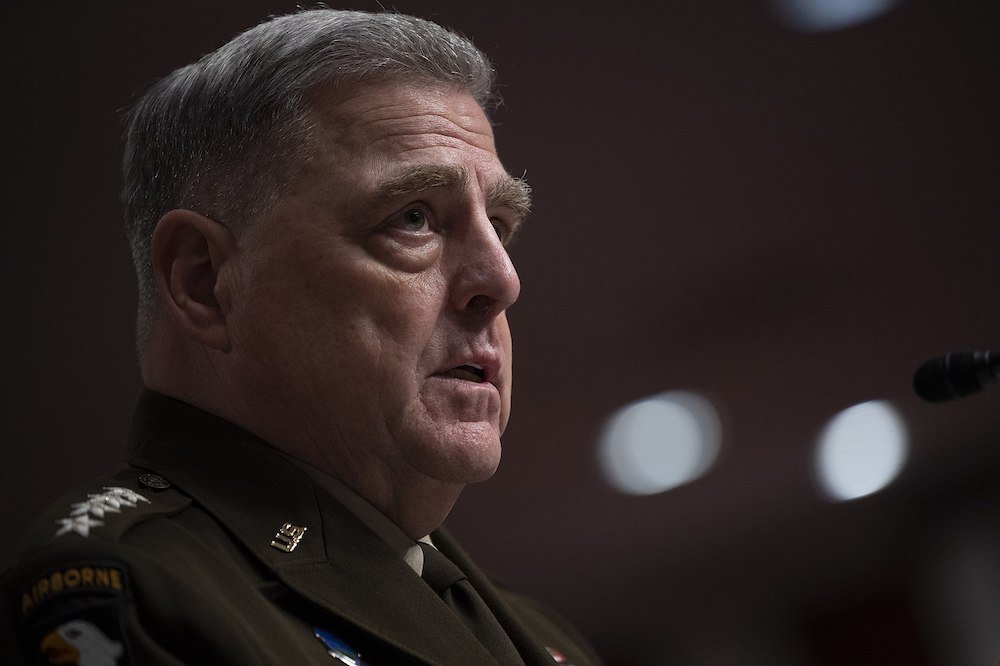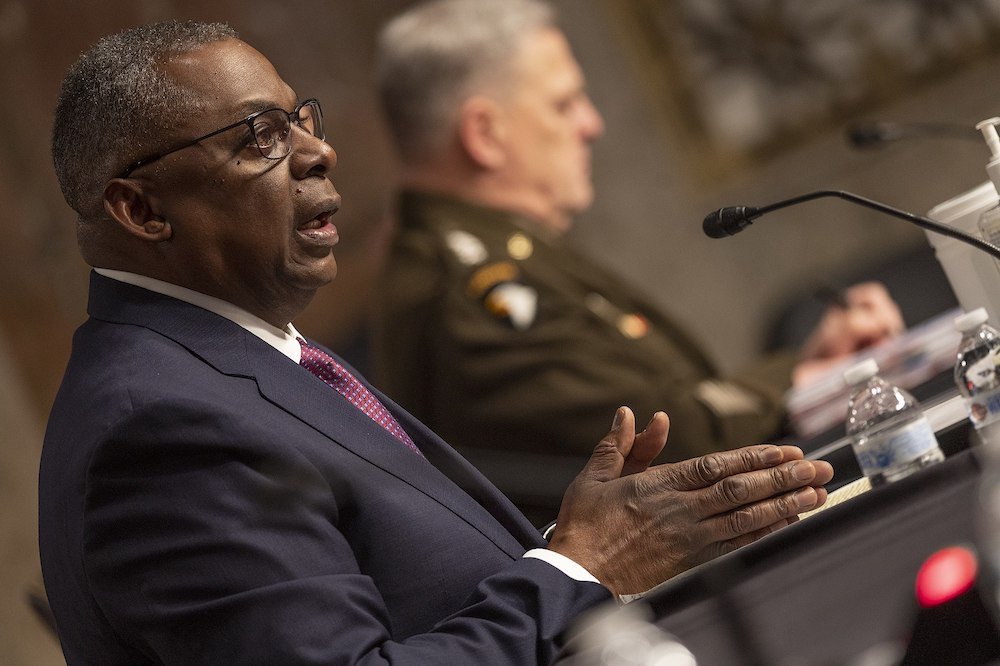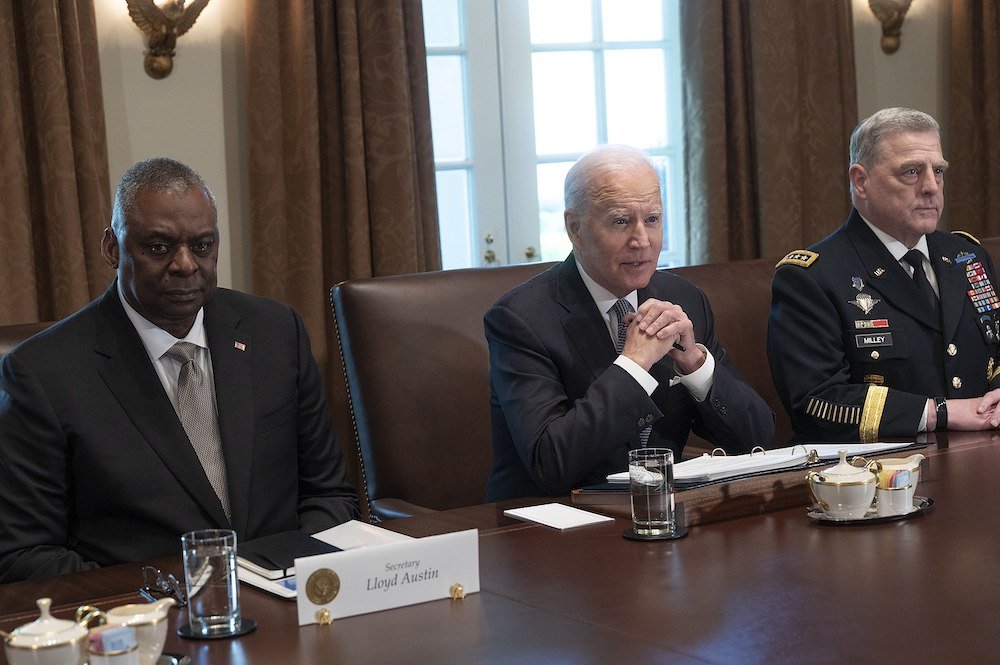

Welcome to this week’s edition of The Intelligence Brief… this week, our analysis will focus on 1) recent statements by U.S. Chairman of the Joint Chiefs of Staff General Mark Milley, 2) why he believes the war in Ukraine represents a threat to the global international security order, 3) what U.S. Secretary of Defense Lloyd Austin had to say about the threat Russia’s invasion of Ukraine poses to Europe and the international community, and 4) the U.S. and its current role in providing security aid to Ukraine, and how this mirrors the statements of military leaders this week.
Quote of the Week
“The main element of any United States policy toward the Soviet Union must be that of a long-term, patient but firm and vigilant containment of Russian expansive tendencies.”
– George Kennan, July 1, 1947.
Before we dive into things, a few stories we’re covering this week at The Debrief include why according to NASA, images of two separate UFOs photographed by the Perseverance Rover hanging in the skies of Mars are most likely fakes. Elsewhere, new research suggests that if you are bilingual, it might also boost your brain health. Also, why are researchers saying that our oceans are slowly getting noisier? Here comes science with the answer. Lastly, be sure to check out this awesome video recently shared online by the Israeli prime minister that shows the country’s Iron Beam laser system blasting an unpiloted drone from the sky. As always, you can find all of our latest stories from The Debrief via the links at the bottom of this newsletter, along with all of our latest video news and interviews on The Debrief’s YouTube page.
With that behind us, it’s time to shift our focus to the statements offered by U.S. military leadership in recent days, and what this means for the stability of security in Europe, and of global international security in general.
Ukraine and the Global International Security Order
Earlier this week, Chairman of the Joint Chiefs of Staff General Mark Milley spoke on camera with CNN’s Jim Sciutto from Ramstein Air Base, Germany, where he was asked about the current situation in Ukraine, and what the recent invasion of the country by Russia means for Europe and the rest of the world.
“What’s at stake here is much greater than Ukraine,” Milley told Sciutto. “What’s at stake is the security of Europe,” the General added, calling the situation “the greatest challenge for the security of Europe since the end of World War II.”


“And indeed,” Milley said, “you could easily make the case that what’s at stake is the global international security order that was put in place in 1945.”
Milley’s statements were made following a recent visit to Europe by Secretary of Defense Lloyd Austin, which included a “stealth” visit to Ukraine and a meeting with allied European countries to discuss the developing situation. For reasons that are probably already clear, the Chairman of the Joint Chiefs of Staff’s comments left many rattled, representing one of the most significant statements from U.S. military leadership since the conflict began.
A Threat to International Order
While speaking with Sciutto, Milley characterized Russia’s invasion of Ukraine on February 24 as being a significant break from the international order that has prevailed since World War II.
“That international order has lasted 78 years,” Milley said. “It’s prevented great power war, and underlining that entire concept is the idea that large nations will not conduct military aggression against smaller nations, and that’s exactly what’s happened here, an unprovoked military aggression by Russia against a smaller nation.”
In addition to its significance to history and international order, Milley was blunt about what it means if Russia’s actions remain unchecked by the international community.
“If this is left to stand, if there is no answer to this aggression,” Milley told Sciutto saying that if Russia remains unchallenged on its actions in Ukraine, “then so goes the so-called international order.”
“And if that happens, then we’re entering into an era of seriously increased instability,” Milley grimly warned.
The Secretary of Defense Weighs In
Milley wasn’t the only high-ranking U.S. military official that weighed in on the situation in Ukraine. Secretary of Defense Lloyd Austin also spoke on the matter, discussing briefings that were discussed during the European meetings which outlined “crucial” considerations for Ukraine in the days ahead.
“We don’t have any time to waste,” Austin said this week, noting that the briefings he and others spoke about “laid out clearly why the coming weeks will be so crucial for Ukraine, so we’ve got to move at the speed of war.”
“And I know that all the leaders leave today more resolved than ever to support Ukraine in its fight against Russian aggression and atrocities,” Austin also said, adding that he applauded “all of the countries that have risen and are rising to meet this demand.”


Both Austin’s and Milley’s remarks drew a range of responses regarding the U.S. and its attitude toward the conflict. David Sangers noted in the New York Times that “The immediate impetus for Mr. Austin’s carefully orchestrated declaration… was to set up President Volodymyr Zelensky of Ukraine with what one senior State Department official called ‘the strongest possible hand’ for what they expect will be some kind of cease-fire negotiations in coming months.”
However, Sangers also acknowledged that Russian President Vladimir Putin will likely reinforce the Russian leader’s “strategic belief that the war is really about the West’s desire to choke off Russian power and destabilize his government.”
U.S. Aid to Ukraine
The statements of the Secretary of Defense and Chairman of the Joint Chiefs of Staff this week were among the most pointed that have been made by U.S. military leadership in recent days regarding the ongoing Ukrainian conflict. Though if anything, the positions offered by Milley and Austin actually mirror earlier statements released by the U.S. Department of State, and only bolster the positions of the United States in relation to the developing invasion.


“Moscow’s actions in Ukraine threaten to set new precedents on European soil,” read a statement at the U.S. Department of State website posted weeks ago, which it said threatened to undermine “basic international principles vital to peace and security.” These include:
- Changes in the territorial integrity of a state by force,
- Infringement of the rights of citizens in a democracy “to determine their country’s future.”
- “All members of the international community are bound by common rules and must face consequences if they break their solemn commitments.”
“These principles extend beyond Ukraine,” the statement read, adding that the same applies to territories beyond Europe.
Similarly, recent figures released by the U.S. Department of Defense that detail security assistance provided to Ukraine by the United States presents what is perhaps the clearest picture in writing of the level of involvement between the two countries, with the U.S. actively working “to identify and provide Ukraine with additional capabilities,” and to “utilize all available tools to support Ukraine’s Armed Forces in the face of Russian aggression.”
For Milley’s part, the path forward seems to be fairly clear for U.S. military leadership, based on his statements on Tuesday.
“Now is the time,” Milley said, “and right now is the opportunity here to stop aggression, and to restore peace and security to the European continent.”
That wraps up this week’s installment of The Intelligence Brief. You can read past editions of The Intelligence Brief at our website, or if you found this installment online, don’t forget to subscribe and get future email editions from us here. Also, if you have a tip or other information you’d like to send along directly to me, you can email me at micah [@] thedebrief [dot] org, or Tweet at me @MicahHanks.


Here are the top stories we’re covering right now…
- NASA Says Video of Mars UFOs Likely Fake
According to NASA, images of two separate UFOs photographed by the Perseverance Rover hanging in the skies of Mars are most likely fakes.
- Research Suggests that Being Bilingual Boosts Brain Health
As the brain ages, it begins to slow down many of its functions. This can lead to loss of memory, loss of clarity, or even certain brain disorders like Alzheimer’s or dementia.
- I Can’t Hear You: How Our Oceans are Slowly Getting Noisier
New research reveals that oceans are getting noisier in some areas, making it harder for fish to communicate.
- Watch Iron Beam Drone Killing Laser in Action Video From Latest Test Shows System is Finally Ready for Deployment
A video tweeted out by the Israeli prime minister shows their Iron Beam laser system blasting an unpiloted drone from the sky.
- Perseverance Starts Year-Long River Delta Life Hunt Delta Considered Likeliest Place for Rover to Find Signs of Ancient Microbial Life
NASA’s Perseverance rover is about to spend the next year hunting an ancient river delta for signs of Martian life.
- New Research Suggests that Green Spaces Can Promote Peace Over War
Green spaces like parks or fields can help boost individual psychology and may help promote peace in a war-torn area.
- Odds Increasing for Life on Jupiter’s Moon Europa
Features found on Jupiter’s moon Europa may dramatically increase the chances of finding life within its sub-surface oceans.
- Magic Mushrooms May Help Stop Opioid Addiction, New Research Suggests
Psilocybin, a compound found in magic mushrooms, may be helpful in helping individuals overcome opioid addiction.
- Have UFOs Ever Attacked Terrestrial Aircraft? It’s complicated, but some of the records are compelling
The cases involving purported attacks by UFOs on aircraft, both military and civilian, is complicated… but some of the records are compelling.
- “Probable Threat” over the U.S. Capitol was a Close Call, but Points to Problems for the FAA
This week, an aviation incident in Washington that occurred Wednesday night has many concerned about oversight by aviation officials in the Nation’s Capitol.
- Are Directed Energy Weapons Behind Havana Syndrome?
Since U.S. personnel working in Cuba began to experience health issues, officials have tried to identify what is causing “Havana Syndrome.”
- Corporate Secrets and Competition at CERN: How Knowledge Leaks Happen
Competition is a normal occurrence within most workplaces. Whether employees are competing over sales, office supplies, or potential clients, some competition can be a good thing. However, when there is too much competition, things can quickly go downhill. Recently, one pair of researchers were able to witness this process in action while comparing two competing groups within CERN (the European Organization for Nuclear Research). Specifically, the researchers found that at CERN, more competition in a workplace can cause employees to […]
- Group Preparing to Send Messages to TRAPPIST-1
A group known as Messaging Extraterrestrial Intelligence (METI) is preparing to send digital messages to the Trappist-1 exoplanet system.
- Scooping Interstellar Fragments from the Ocean Floor
On April 6, 2022, the U.S. Space Command tweeted a formal letter confirming a meteor as originating from outside the solar system.
- Electric Cars May Be Able to Power Your Home, But Not Yet
Electric cars are becoming more popular, but they’re not yet able to power your home… and science gives us the reason why.
- Go Big Brained or Go Home: The Secret to Parrots’ Long Lives in Brain Size
New research suggests that a parrot’s large brain size may also help researchers explain their lengthy lifespan.
